Informative Essay


What is an Informative Essay and How to Write One?
11 min read
Published on: Aug 11, 2021
Last updated on: Oct 26, 2024

People also read
Good Informative Essay Topics for All Academic Levels
Share this article
Have you been assigned an informative essay but don’t know where to start? This guide has got you covered!
An informative essay is a common assignment for school or college students. The goal is to provide detailed information to the readers about the specific topic.
Read on to find simple step-by-step instructions for writing an interesting and engaging informative essay. You’ll also get to read helpful examples and tips you can follow to make your essay even better!
Let’s dive in!
On This Page On This Page -->
Informative Essay Definition
The informative essay can be simply defined as,
"A form of essay writing that aims to educate and inform the reader about a specific topic."
Informative essays can cover a variety of topics. It could be written about a particular thing, event, or natural phenomenon, etc.
This type of essay highlights the objective facts and evidence without reflecting the writer's subjective point-of-view about the topic.
What is the Purpose of an Informative Essay?
An informative essay presents objective and verifiable information about a topic. It relies on factual evidence and reliable sources.
The main goal of writing an informative essay is to;
- Inform the reader about something.
- Explain a particular subject.
- Transmit verified knowledge clearly and concisely.
Types of Informative Essay
There are several types of informative essays, and each type has its own purpose and style. Here are some of the informative essay types that you need to know.
- Descriptive Essay
A descriptive essay is an essay that describes something about an event, person, place, or idea in detail. The descriptive essay aims to provide enough information to the readers to visualize or imagine the matter described.
Want to know more about descriptive essays? Check out this descriptive essay writing blog to learn more.
- Cause and Effect Essay
The cause and effect essay describes the cause of an event or idea and then explains its effects on today’s world and people. Also, this type of essay is a common form of organization in academic writing.
However, the cause-and-effect essay requires strong research skills. Without them, your essay will not become a successful piece of writing.
- Compare and Contrast Essay
In a compare and contrast essay, the writer discusses the similarities and differences between two or more things. This type of essay also requires strong critical thinking skills.
Therefore, when you start writing the compare and contrast essay , you should identify and analyze the subject from all angles and characteristics.
- Process Essay
The process essay is also known as the "How-To" essay. This essay provides information about how a process occurs or about the process of doing something.
- Problem-Solution Essay
A problem-solution essay is another common type of informative essay in which you describe a problem and then propose its solution. Its main purpose is to educate the readers on the problem and its significance.
Looking for more information? Visit our problem-solution essay guide and learn to write perfect problem solution essays.
- Expository Essay
The expository essay explains, illustrates, or interprets something in a way that becomes easy for the readers. This essay provides a fair analysis of the subject based on facts without the writer’s opinions.
Here is a simple video that explains informative writing:
How to Start an Informative Essay?
Before you can start writing, you have to do some "rewriting." Here are the steps involved in prewriting:
- Brainstorm Ideas
Brainstorming is the first step in writing any type of essay . Here, you brainstorm several topic ideas and generate a list of potential topics.
So think about all the possible ideas that are related to your interest and subject. This will help you choose an interesting topic for your essay.
- Choose a Topic
Choosing the right topic is essential for writing a great essay. A good topic will not only make your writing process easy but also make the research phase interesting.
So choose a topic you can easily write about and support it with facts, evidence, and statistics. In short, the topic should be interesting and easy to research.
- Know Your Target Audience
Your audience determines the style and tone of your essay. Consider who will be reading your essay and what their background, knowledge, and interests might be.
For instance, if you are writing for school children, your language should be simple, easy, and interesting. Meanwhile, writing for a professional audience requires you to use technical terminology and jargon.
So always think about who you are writing for and determine your audience before proceeding.
- Do the Research
You have to do some research to gather information for your essay. Make sure the information that you collect is reliable and accurate.
Use a variety of sources for research, including research articles, books, documentaries, etc. You should also take detailed and organized notes to keep track of the information you find, so you can use it later.
- Create an Outline
An essay outline helps the writer keep their focus strong and narrow. With the help of an outline, you will easily organize your thoughts and ideas.
So create an outline of your essay to lay out a structure.
Don't know how to make an informative essay outline? Don’t worry, read on to find out.

Paper due? Why Suffer? That's our job.
Informative Essay Outline
Crafting a well-structured essay involves planning what points to include and how it all ties together. Creating an outline is the best way to ensure that your work is well-structured.
An informative essay outline is outlined in the following way:
Let’s discuss these outline parts in detail.
Introduction
- Start with a captivating hook that grabs the reader's attention. It could be an intriguing fact, a relevant quote, or a thought-provoking question.
- State your thesis statement . It is the last part of the introduction that clearly presents the main idea or argument of your essay. It should reflect the informative nature of your essay and guide the reader on what to expect.
- Divide the body of your essay into several paragraphs. Each paragraph should focus on one specific aspect or subtopic related to your main thesis.
- Start each paragraph with a topic sentence that introduces the main point of that paragraph.
- Analyze and discuss your supporting evidence. They could be examples, facts, or statistics that provide informative content.
Conclusion
- Summarize the main points covered in your essay.
- End with a thought-provoking statement, a call to action, or a suggestion for further exploration of the topic.
Here is an example outline template that you can use to write your informative essay outline
Informative Essay Outline Template
How to Write an Informative Essay?
Once you have done the prewriting, you have got everything you need to start. Following the steps below will help you write a great informative essay.
How to Write an Informative Essay Introduction?
The introduction of an essay sets the tone of the essay and provides an overview of the topic. Here are some key elements you need to include when writing an informative essay introduction:
- Attention-Grabber / Hook:
The hook is the first line of the essay that aims to pique the readers’ interest. This can be:
- An interesting fact,
- A thought-provoking question,
- Or a compelling anecdote related to your topic, etc.
The hook should be related to your topic and should be engaging enough to grab the reader's attention.
Struggling to come up with a good hook? These 200+ hook examples will help you craft an excellent hook!
- Background Information:
After grabbing the reader’s attention, you have to them to your topic. Discuss some background details on the topic to provide context.
Also, discuss the relevance or importance of the subject matter. This helps the reader understand the significance of the information you're about to present. Moreover, use clear and concise language to provide essential and interesting details to make the reader want to continue reading.
- Thesis Statement:
The thesis statement presents the main topic or idea of the essay in a concise and clear way. It provides an overview of what will be covered.
The thesis statement is the last part of the introduction. It should be specific, focused, and encompass the main ideas you'll be discussing in the body of the essay.
How to Write an Informative Essay Body Paragraphs?
The body paragraphs are the major chunk of your essay. They provide all the information about your chosen topic. There should be at least three body paragraphs in your essay, although there can be more depending on your topic.
Here are the key elements of the informative essay body paragraphs:
- Topic Sentence
Begin each body paragraph with a clear topic sentence that introduces the main point you will be discussing in that paragraph. It is the first sentence of the paragraph and should be clearly related to the thesis.
- Provide Information and Evidence
In an informative essay, information and evidence should be presented clearly and logically. So present the facts, examples, statistics, or quotations that inform the reader about the topic. This information should come from reliable and credible sources.
- Discuss and Elaborate
After presenting the evidence, explain and discuss them to ensure a thorough understanding of the information. Clarify any complex terms, concepts, or ideas that may require explanation for understanding the topic effectively.
- Use Transitional Phrases:
Use transitional phrases or sentences to connect paragraphs and ideas. This helps maintain a cohesive flow of information throughout the essay.
For instance, transitional words such as "moreover," "furthermore," "on the other hand," or "in addition to" can be used to link ideas logically.
Having a difficult time with smooth transitions? Here’s a list of transition words for essays to help you out!
How to Write an Informative Essay Conclusion?
In an essay conclusion , you wrap up the essay and provide a sense of closure. Writing the informative essay conclusion includes the following steps:
- Summarize the Main Points:
Revisit the main points covered in your essay's body paragraphs and provide a concise summary of the information presented. Do not introduce any new information or arguments in the conclusion.
- Restate your Thesis Statement
Begin your conclusion by restating your thesis statement in a slightly different way. This helps remind the reader of the main objective of your essay.
- Provide a Thought-Provoking Statement:
End your conclusion with a thought-provoking statement, reflection, or question that leaves a strong impression on the reader. This can help inspire them to continue exploring the topic beyond your essay.
Edit and Proofread the Essay
Once you are done with your first draft, take some time to proofread and revise you essay. Check for grammar and spelling, format, logical coherence, and clarity. Remove any repetitive statements or unnecessary details.
Revising your essay will make it even better and more interesting to read.
Informative Essay Examples
Reading some good examples will make writing an informative essay easier for you. Here are a few short informative essay examples that demonstrate how it looks like. Be sure to read them out.
Informative Essay about Stress
Informative Essay on Diabetes
Informative Essay on Netflix
Informative Essay on Tree in Winter
Informative Essay Topics
A good essay topic is a key to a successful essay. Here are a few ideas that will get you inspired:
- The Benefits of Regular Exercise
- The Importance of Recycling
- The Process of Photosynthesis
- What was the Big Bang?
- The History of the Internet
- How did the Dinosaurs go extinct?
- The Benefits of Meditation
- The Impact of Climate Change on Ecosystems
- The Role of Technology in Education
Stuck on choosing your topic? Don’t worry! Check out our list 200 informative essay topics to get inspiration!
To Sum Up,
This guide introduced everything you needed to start writing an informative essay. By following the steps outlined in this guide, you can confidently embark on your informative writing journey.
Are you in a race against the deadline and need professional help? We’ve got you covered!
We are a legit essay writing service with professional essay writers. Our team of experts writes high-quality, original, and customized essays tailored to your unique requirements.
Our essay writing service has worked on informative essays and academic papers on various topics, with a high rate of customer satisfaction!
You can also maximize the benefits of our AI writing tool to polish and refine your writing skills.
Frequently Asked Questions
What should be included in an informative essay.
Here are some points that should be included in an informative essay.
- Thesis statement
- Strong evidence
- Examples
What is the main topic of an informative essay?
The main topic of an informative essay is to educate the readers on a specific topic.
Nova A. (Literature, Marketing)
As a Digital Content Strategist, Nova Allison has eight years of experience in writing both technical and scientific content. With a focus on developing online content plans that engage audiences, Nova strives to write pieces that are not only informative but captivating as well.
Need Help With Your Essay?
Also get FREE title page, Turnitin report, unlimited revisions, and more!
Keep reading

OFF ON CUSTOM ESSAYS
Essay Services
- Argumentative Essay Service
- Descriptive Essay Service
- Persuasive Essay Service
- Narrative Essay Service
- Analytical Essay Service
- Expository Essay Service
- Comparison Essay Service
Writing Help
- Term Paper Writing Help
- Research Writing Help
- Thesis Help
- Dissertation Help
- Report Writing Help
- Speech Writing Help
- Assignment Help
Legal & Policies
- Privacy Policy
- Cookies Policy
- Terms of Use
- Refunds & Cancellations
- Our Writers
- Success Stories
- Our Guarantees
- Affiliate Program
- Referral Program
Disclaimer: All client orders are completed by our team of highly qualified human writers. The essays and papers provided by us are not to be used for submission but rather as learning models only.

Informative Essay
Informative essay generator.
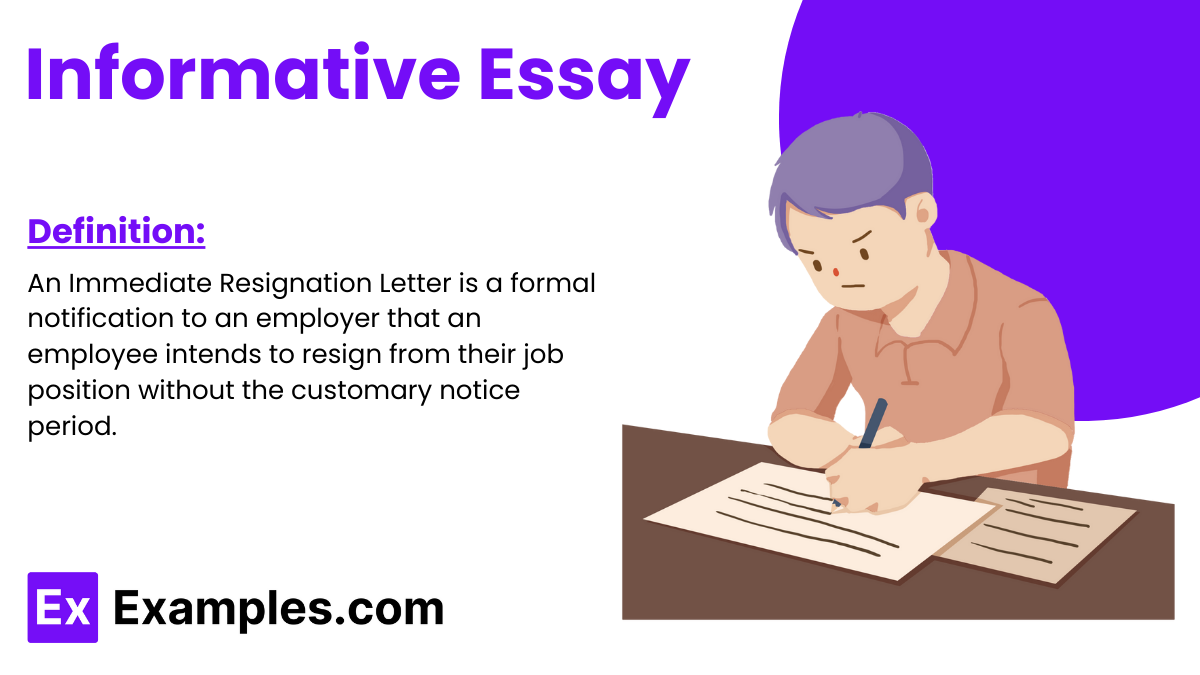
An Informative Essay stands out in the academic world as a tool for students to elaborate on specific topics with depth and clarity. By incorporating factual details and supporting evidence, these essays educate and enlighten the reader. This guide, enriched with practical essay examples , is tailored to assist students in mastering the art of crafting compelling and informative essays. Whether for school assignments or personal exploration, these examples provide valuable insights into effective informative essay writing.
What is an Informative Essay?
An informative essay is a genre of writing aimed at educating the audience on a particular topic or subject. This type of essay doesn’t just offer facts but also provides insights and explanations to help readers understand the subject matter more deeply. Unlike persuasive essays, which aim to convince readers of a particular viewpoint, informative essays are neutral; they do not express the writer’s personal opinions or arguments.
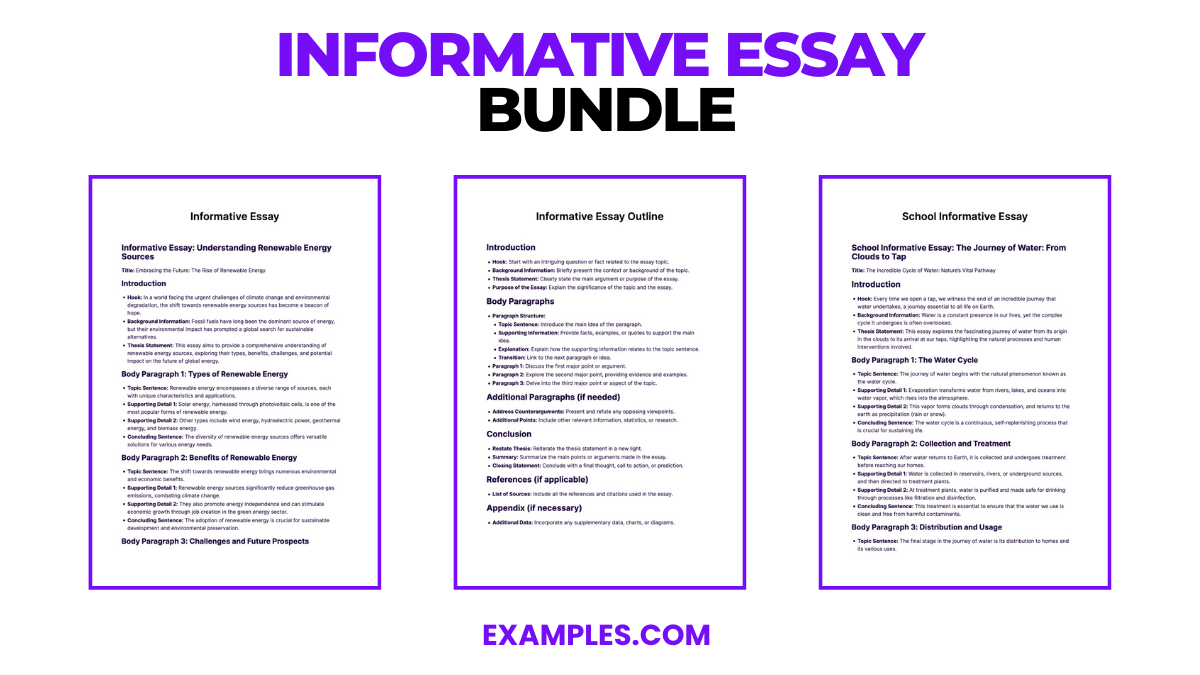
Download Informative Essay Bundle
You may have already been flooded with all these load of essays that your teacher asked you to write. You are probably thinking of a clever way on how to get away from the situation where you probably have not ever dreamed of. However, it is a task that we should all be thankful for. Essay writing actually brings more benefits than browsing through those social media platforms that you have already memorized. It does not only sharpen your minds and makes you more creative than putting likes and hitting shares of your friends’ post. The ability to share something from your mind is definitely a plausible act.
Informative Essay Format
Crafting an informative essay requires a structured approach to organize the wealth of information in a way that’s easily understandable to the reader. The format of an informative essay typically consists of three main parts: the introduction, the body, and the conclusion. Following this format helps in developing a coherent and logically flowing essay that effectively informs the reader.
Introduction
The introduction sets the stage for the entire essay. It should start with a hook that grabs the reader’s attention, such as a surprising fact, a question, or a vivid description of the topic. Following the hook, provide some background information to help readers understand the context of the essay. Finally, the introduction should end with a clear and concise thesis statement that outlines the main points or aspects of the topic that will be discussed. This statement acts as a roadmap for the essay, guiding the reader through the information presented.
Components of the Introduction: Hook : Engages the reader’s interest. Background Information : Provides context for the topic. Thesis Statement : Outlines the main points to be discussed.
Body Paragraphs
The body of an informative essay is where the main information is presented. It should be divided into paragraphs, with each paragraph focusing on a specific point or aspect of the topic. Start each paragraph with a topic sentence that introduces the point to be discussed. Follow this with supporting details, such as facts, examples, statistics, and quotes from credible sources. Each paragraph should be coherent and focused, contributing to the overall argument or presentation of the topic.
Structure of Body Paragraphs: Topic Sentence : Introduces the main idea of the paragraph. Supporting Details : Facts, examples, and evidence supporting the topic sentence. Transition : Smoothly connects to the next paragraph or point.
The conclusion of an informative essay wraps up the essay by summarizing the main points discussed. It should restate the thesis statement in a new way, reflecting the information presented in the essay. The conclusion can also highlight the importance or relevance of the topic, offering final insights or thoughts for the reader to consider. This section should leave the reader with a clear understanding of the topic and its significance. Elements of the Conclusion: Restatement of Thesis : Reflects the main points made in the essay. Summary of Main Points : Briefly recaps the key information discussed. Final Insight : Offers closing thoughts or implications of the topic.
Formatting Tips:
Use clear and concise language throughout the essay. Ensure each paragraph flows logically to the next. Cite sources where necessary to back up facts and claims. Keep the essay focused on informing the reader, avoiding personal opinions.
Types of Informative Essay
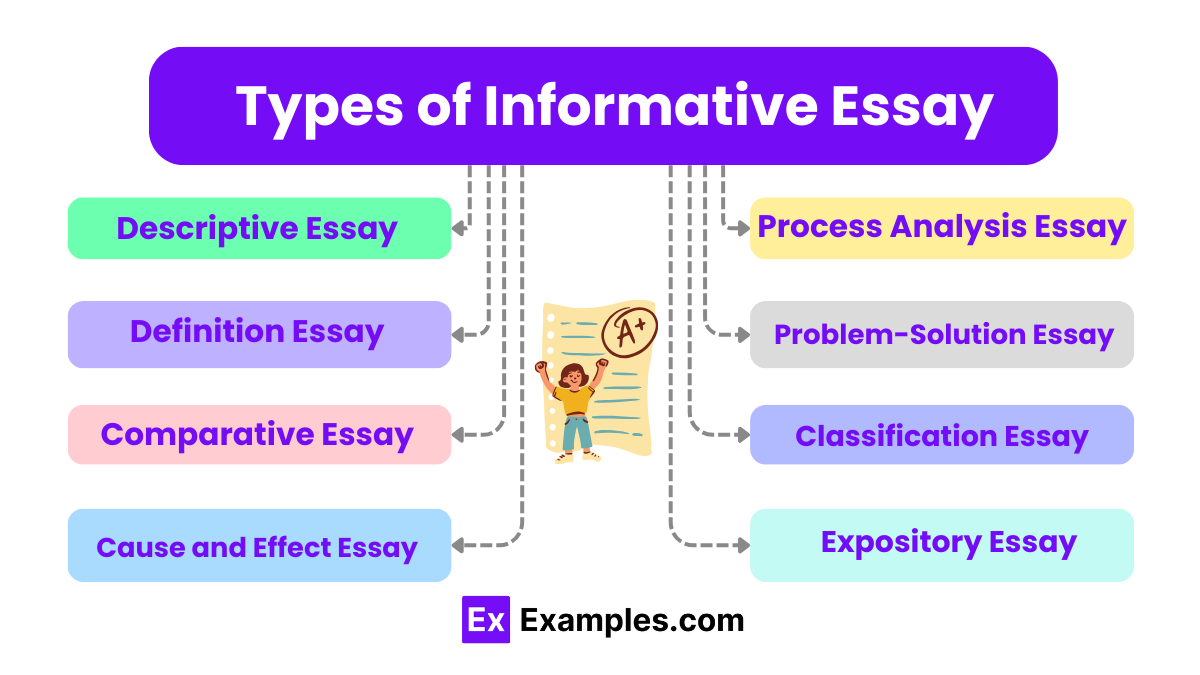
Download This Image
- Descriptive Essay : Provides a detailed description of a person, place, object, or event, using sensory details to paint a vivid picture for the reader.
- Definition Essay : Explores the meaning, history, and implications of a complex concept or term, offering a deep and thorough understanding beyond basic definitions.
- Compare and Contrast Essay : Analyzes two or more subjects by comparing their similarities and contrasting their differences, highlighting the nuances between them.
- Cause and Effect Essay : Examines the reasons why something happened (cause) and the outcomes that followed (effect), aiming to establish a clear relationship between events.
- Process Analysis Essay : Explains how something is done, how something occurs, or how something works, in a step-by-step format, providing clear instructions or insights.
- Problem-Solution Essay : Identifies a specific problem and proposes one or more solutions, focusing on presenting viable and effective ways to address the issue at hand.
- Classification Essay : Organizes or sorts different subjects or objects into categories based on shared characteristics, providing a clear understanding of their relationships and differences.
- Expository Essay : Presents a balanced analysis of a topic, using facts, statistics, and examples, aiming to explain or clarify a subject in a straightforward, unbiased manner.
How is an Informative Essay Structured?
An informative essay is structured in a clear, organized manner to effectively convey information to the reader. This structure consists of three main parts: the introduction, the body paragraphs, and the conclusion. Here’s how each part is typically organized:
- Hook : Begins with a captivating opening to grab the reader’s attention. This could be an interesting fact, a question, or a startling statistic related to the topic.
- Background Information : Provides context for the topic being discussed. This section gives the reader any necessary background information to understand the essay.
- Thesis Statement : Concludes the introduction with a clear, concise statement that outlines the main points or focus of the essay. This statement guides the rest of the essay.
- Topic Sentence : Each body paragraph starts with a topic sentence that introduces the main idea of the paragraph, relating back to the thesis statement.
- Supporting Details : These are facts, examples, or explanations that provide evidence to support the topic sentence. This may include statistics, quotes from credible sources, or logical arguments.
- Analysis : This section interprets the supporting details, explaining how they relate to the topic and the thesis statement. It’s where the writer’s insight comes into play, providing depth to the information presented.
- Transition : Each paragraph ends with a sentence that provides a smooth transition to the next paragraph, maintaining the flow of the essay.
- Summary of Main Points : Begins by briefly summarizing the key points or information presented in the body paragraphs, reinforcing the essay’s main ideas.
- Restatement of the Thesis : Reiterates the thesis statement in light of the information and analysis provided, emphasizing the essay’s main argument or focus.
- Closing Statement : Concludes with a final thought or call to action, leaving the reader with something to ponder or suggesting steps for further exploration of the topic
7 steps for Writing an Informative Essay
- Choose Your Topic : Select a topic that interests you and meets the assignment’s criteria. Ensure it is broad enough to research but narrow enough to be covered in your essay.
- Conduct Research : Gather information from reliable sources to understand your topic thoroughly. Look for facts, statistics, and examples that will provide a solid foundation for your essay.
- Create an Outline : Organize your thoughts and research into an outline. This will help structure your essay logically, ensuring a clear flow of ideas from the introduction through the body paragraphs to the conclusion.
- Write the Introduction : Begin with a hook to capture the reader’s interest, followed by background information to set the context for your topic. Conclude the introduction with a thesis statement that presents the main focus or argument of your essay.
- Develop Body Paragraphs : Each paragraph should focus on a single main idea that supports your thesis. Start with a topic sentence, followed by evidence and examples. Include your analysis to explain how this evidence relates to your topic.
- Conclude Your Essay : Summarize the main points of your essay, restate your thesis in light of the information provided, and offer a final thought or call to action. This is your chance to reinforce the importance of your topic and the information you’ve presented.
- Revise and Edit : Review your essay for any errors or unclear parts. Check for grammar, punctuation, and spelling mistakes. Ensure your writing is clear, concise, and logically organized. It may help to get feedback from others or to step away from your essay for a while before reviewing it again.
Purpose of Informative Essays
Informative essays serve a foundational role in educational and communication contexts, aiming to enlighten the reader on a specific topic or subject matter. The core purpose of these essays is to inform, explain, and educate without presenting the author’s opinion or persuading the reader to adopt a particular viewpoint. Here’s a deeper look into the primary objectives of informative essays:
Educate the Reader
The most direct purpose of an informative essay is to educate its audience. By presenting facts, data, and detailed explanations, the essay seeks to expand the reader’s knowledge on a given subject. This is particularly valuable in academic settings, where understanding diverse topics is essential to a well-rounded education.
Provide Clarity and Insight
Informative essays often tackle complex subjects that may be difficult to understand at first glance. Through clear writing and structured explanation, these essays break down intricate concepts into digestible parts, offering insight and clarity. They help the reader grasp the nuances of topics ranging from scientific theories to historical events and beyond.
Enhance Critical Thinking
By presenting information from various angles and including detailed analyses, informative essays encourage readers to engage in critical thinking. Readers are prompted to consider the hows and whys of the subject matter, analyze the information presented, and connect it to broader contexts or their personal knowledge.
Stimulate Interest
Although the primary aim is to inform, a well-crafted informative essay can also spark interest in the topic. By uncovering intriguing facts or presenting the subject in a compelling manner, the essay can motivate readers to explore the topic further on their own, fostering a culture of learning and curiosity.
Support Academic and Professional Success
In academic settings, informative essays are a tool for students to demonstrate their understanding of a topic, their ability to conduct thorough research, and their proficiency in communicating complex ideas. Professionally, these essays contribute to knowledge sharing within industries, helping individuals stay informed about current trends, innovations, and foundational concepts.
Build Foundation for Further Exploration
Informative essays lay the groundwork for deeper research and exploration. By providing a comprehensive overview of a topic, they equip readers with the basic knowledge necessary to delve into more specialized studies or related subjects, serving as a stepping stone for academic and personal growth.
10+Informative Essay Samples
15+ informative essay examples.
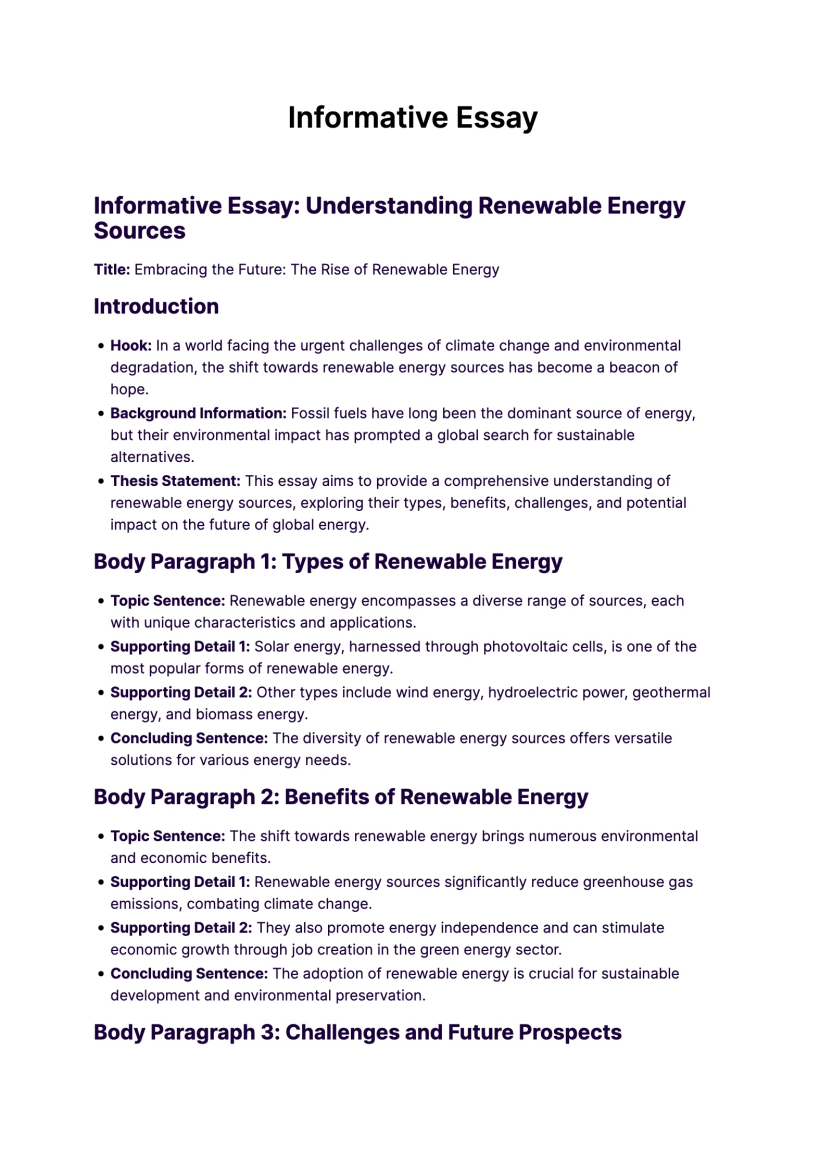
Free Download
Informative Essay Outline
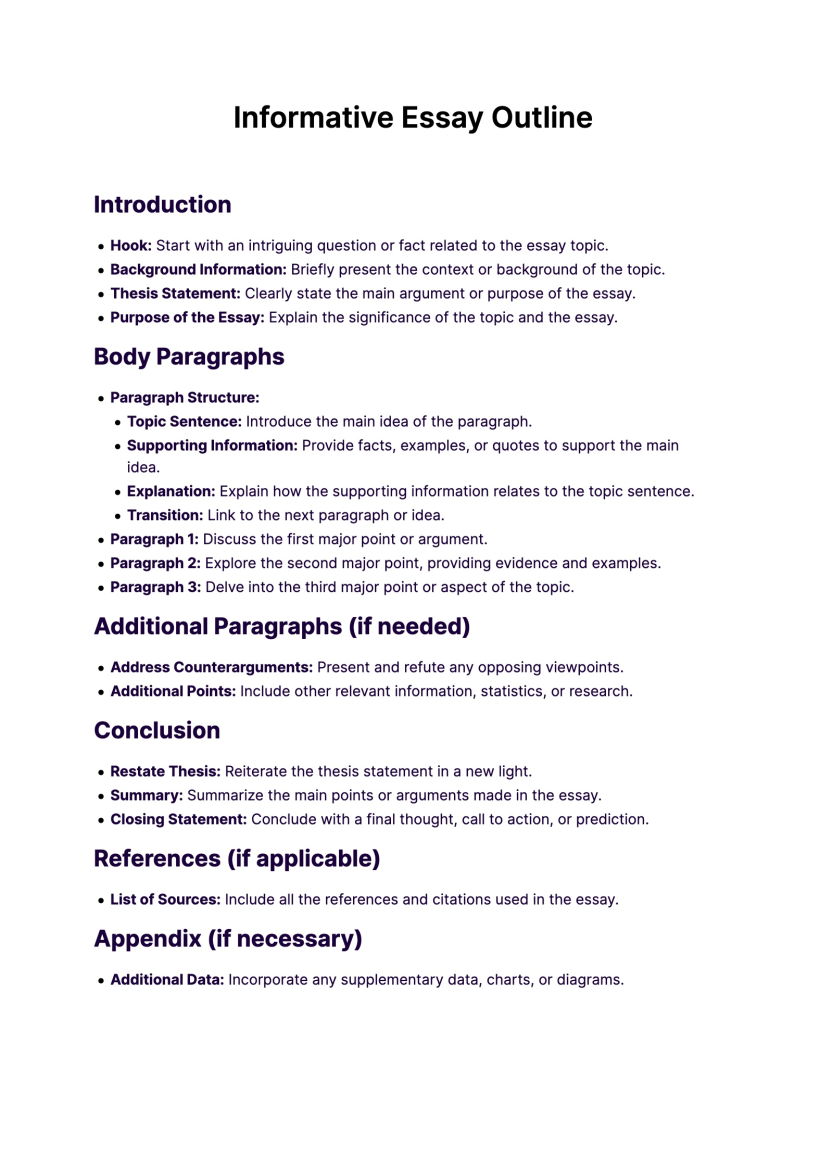
School Informative Essay
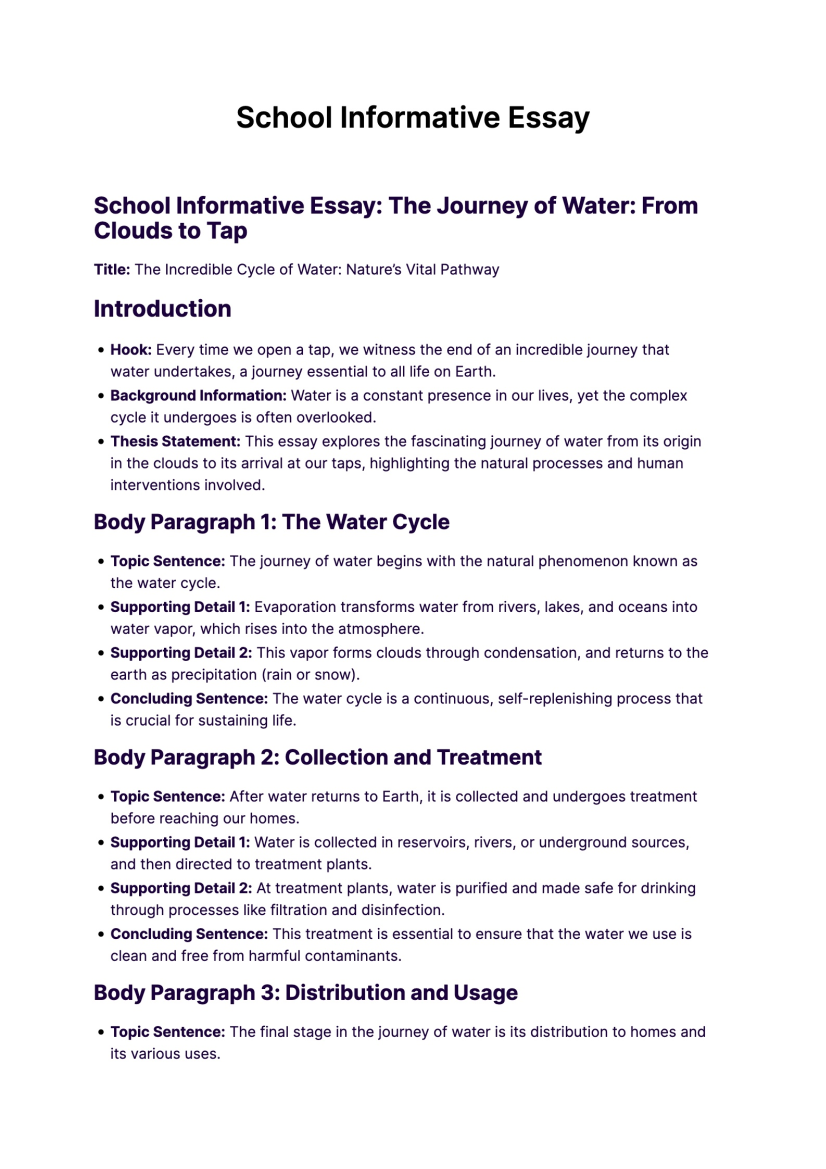
Informative Essay Example
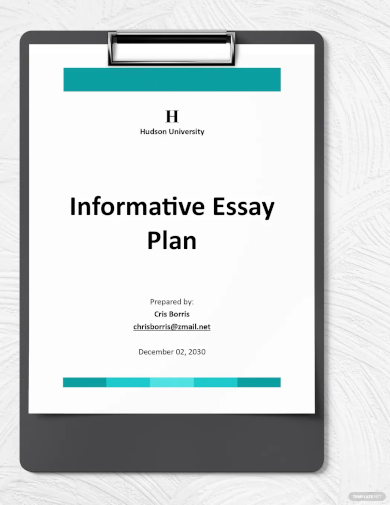
Expository Informative Example
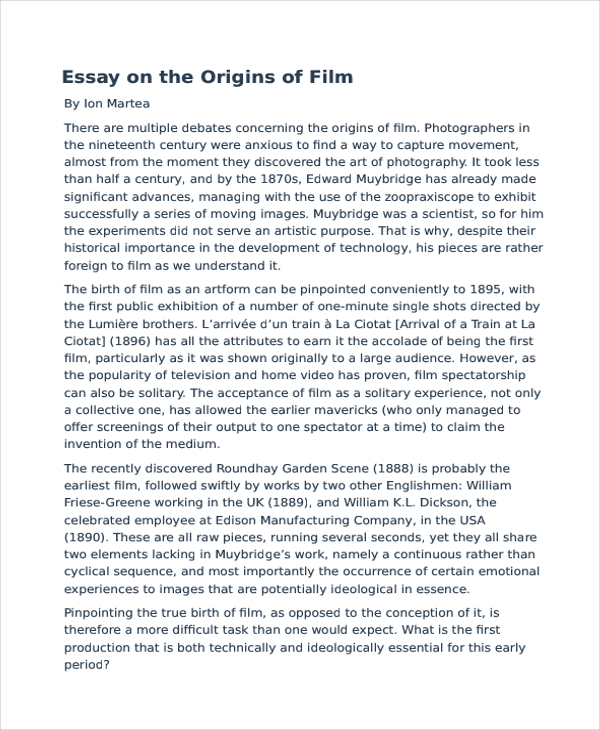
Student Informative Sample
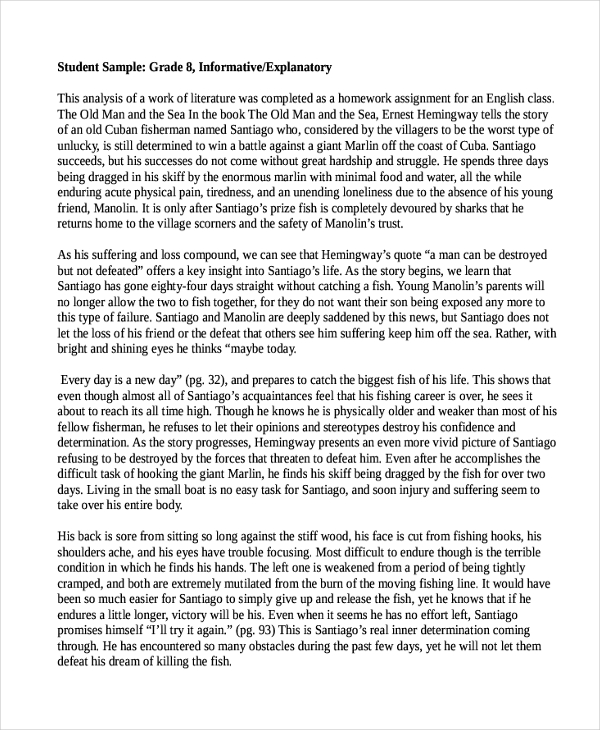
Short Informative Essay
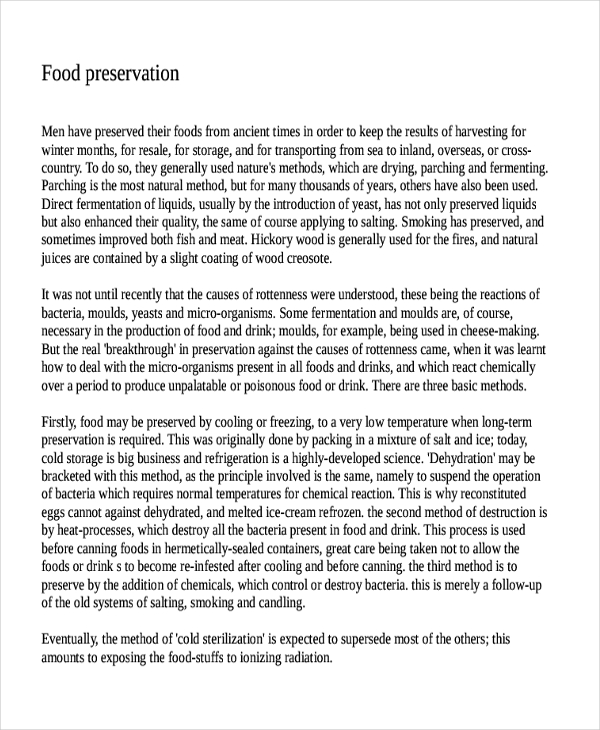
What Is an Informative Essay?
Informative essay is a written as literary essay piece with the purpose of educating a target audience or readers regarding a certain topic or subject.
It is intended to present or expose something while at the same time avoiding to present arguments or personal opinion from the writer. An informative essay is also sometimes called an expository essay in the sense that it also aims to expose or display an information which will be beneficial for the reader.
It does not present bias judgments nor favorable ideas. It does not also dwell in the concept of convincing readers to do things that are contrary to their will.
How to Write an Informative Essay
Writing an informative essay is like telling a blind person what is the color of the sky or telling a kid what are ice creams made of. You simply just have to present a topic and expand.
- Think of a topic. The first thing that you have to do is think of a topic that you want to right about. It would be good if it is something that you are most passionate about so you can write in great details.
- Create a format. The most effective format is using the essential parts of an essay .
- Present your ideas. After choosing the topic, start writing your ideas. Try to present it in a way that you are educating the readers.
College Informative Essay
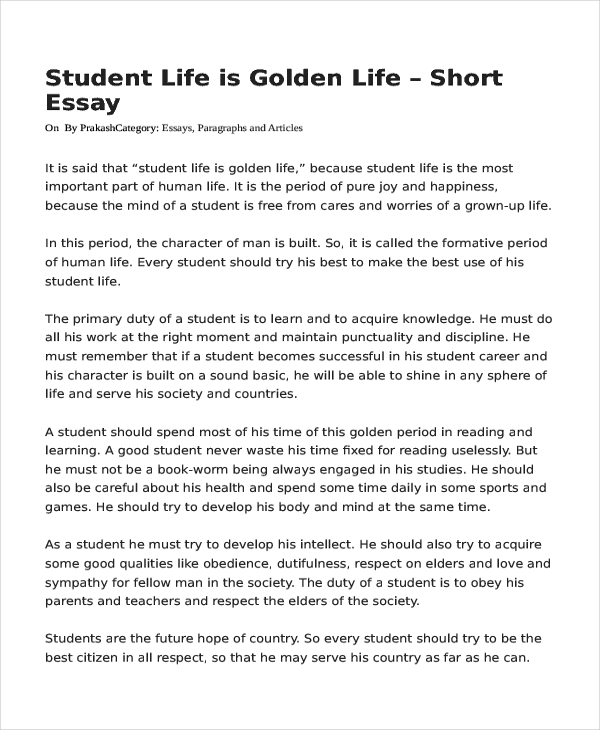
Middle School Informative

Narrative Informative Example
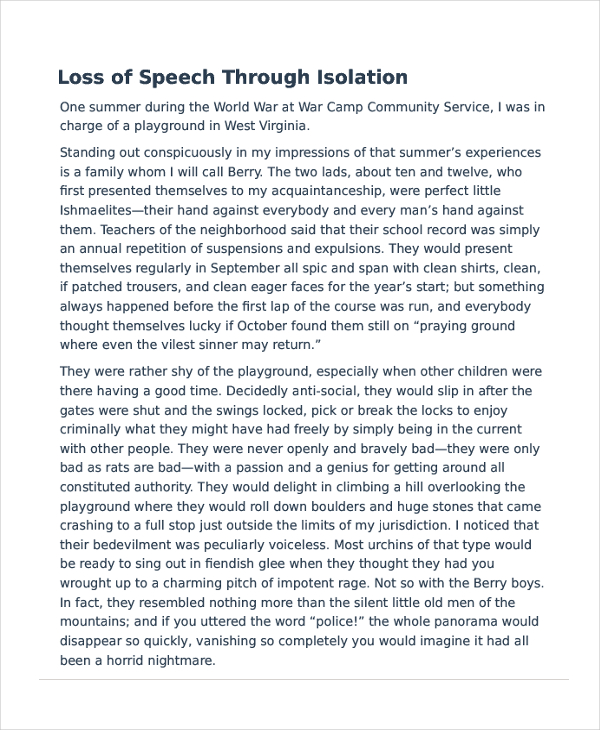
Informative Essay Example
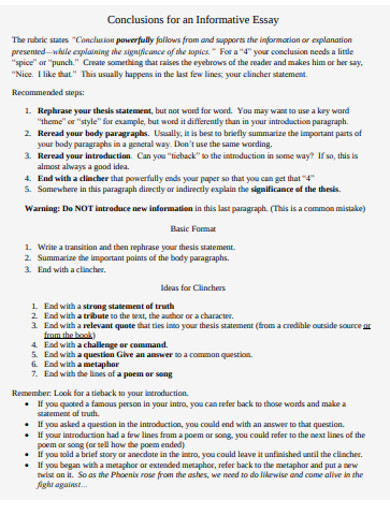
Sample Informative Essay
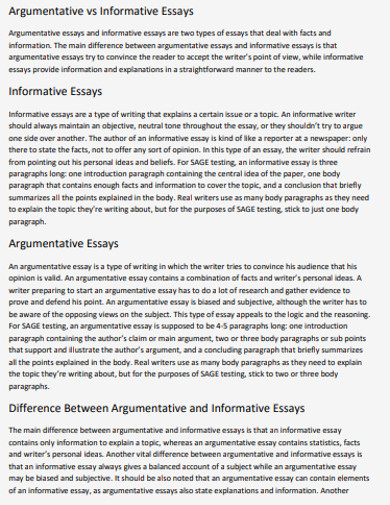
Informative Organizer Essay
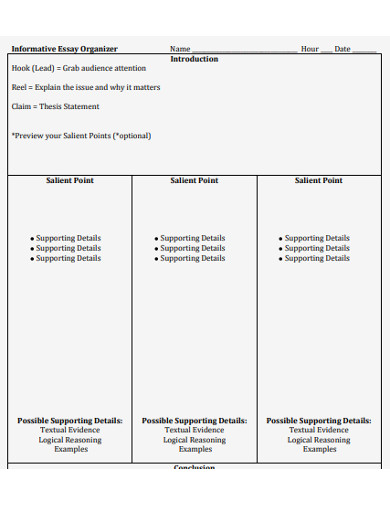
Informative Assignment Essay
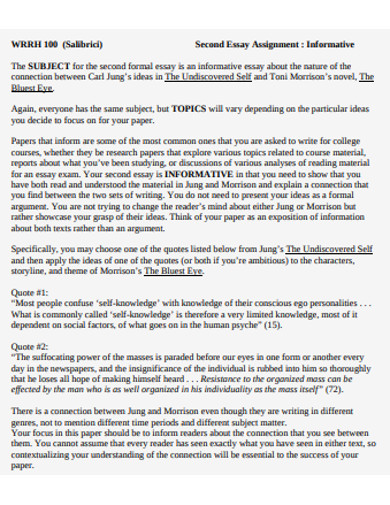
Uses of Informative Essay
1. educational tools.
- Learning and Teaching : Informative essays are widely used in educational settings to teach students about specific topics. They serve as a means for students to research, organize, and present information, enhancing their learning process. For educators, these essays are a tool to assess students’ understanding and ability to communicate knowledge effectively.
2. Enhancing Understanding
- Complex Concept Clarification : These essays break down complex concepts into more understandable parts, making it easier for readers to grasp difficult subjects. They can demystify scientific principles, historical events, or technological advancements, providing clarity and insight.
3. Communication of Ideas
- Knowledge Sharing : In professional and academic communities, informative essays facilitate the sharing of knowledge and ideas. They allow experts to communicate findings, theories, and analyses, contributing to the collective understanding of a field.
4. Awareness and Information Dissemination
- Public Awareness : Informative essays play a crucial role in raising awareness about important issues, such as health, environmental concerns, and social justice. By presenting facts and information, they help inform public opinion and encourage informed decision-making.
5. Basis for Further Research
- Foundation for Exploration : These essays provide a foundation for further research. By offering a comprehensive overview of a topic, they can inspire readers to explore subjects in greater depth, paving the way for advanced studies and discoveries.
6. Professional Development
- Skill Enhancement : Writing informative essays helps individuals develop valuable skills, including research, critical thinking, organization, and writing. These skills are essential in many professional contexts, enhancing career prospects and professional competence.
7. Decision Making and Problem Solving
- Informed Decisions : In the business world and personal life, informative essays can provide the necessary background to make informed decisions. Understanding all aspects of a situation or topic can lead to better problem-solving strategies and outcomes.
8. Cultural and Social Engagement
- Cultural Insight : Essays about cultural practices, societal trends, and historical backgrounds offer readers insights into different ways of life and perspectives, promoting cultural understanding and empathy.
9. Personal Growth
- Intellectual Stimulation : Reading and writing informative essays can be intellectually stimulating, encouraging curiosity and a love for learning. They can broaden one’s horizons and foster a more informed and thoughtful perspective on the world.

Importance of Informative Essay
- Facilitates Learning and Education : They are essential tools in educational settings, helping students learn and understand various topics across different subjects.
- Promotes Critical Thinking : Writing and reading informative essays encourage critical thinking by requiring analysis and synthesis of information.
- Enhances Research Skills : The process of writing an informative essay improves research skills, teaching individuals how to gather, evaluate, and organize information effectively.
- Improves Writing and Communication Skills : Informative essays help in honing writing skills, including structuring arguments, maintaining clarity, and engaging the audience with informative content.
- Encourages Intellectual Curiosity : They stimulate curiosity about the world, encouraging readers and writers to explore topics deeply and broadly.
- Supports Informed Decision Making : By presenting facts and data, informative essays enable readers to make decisions based on knowledge and insights rather than assumptions or misinformation.
- Builds a Foundation for Further Study : They lay the groundwork for more in-depth research and analysis, serving as a stepping stone to more specialized studies.
- Spreads Awareness on Important Issues : Informative essays are a powerful medium for raising awareness about social, environmental, and health-related issues, contributing to public education and action.
- Promotes Cultural Understanding and Empathy : Essays on cultural and societal topics promote understanding and empathy towards different communities and ways of life.
- Contributes to Professional Development : The skills gained from researching and writing informative essays are valuable in professional settings, enhancing abilities in documentation, presentation, and critical analysis.
- Serves as a Source of Inspiration : Reading informative essays can inspire new ideas, hobbies, or even career paths by introducing readers to previously unknown subjects or deeper aspects of familiar topics.
- Facilitates Clear and Effective Information Dissemination : In both academic and professional contexts, the ability to clearly and effectively disseminate information is critical, and informative essays are an excellent medium for this purpose.
How Do You Start an Informative Essay Sentence?
Start an informative essay sentence with a hook such as a surprising fact, a question, or a quote to grab the reader’s attention and draw them into the topic.
How Do You Structure an Informative Essay?
Structure an informative essay with an introduction that includes a hook and thesis statement, body paragraphs that explore the topic in detail, and a conclusion that summarizes the main points.
What Should Each Body Paragraph Begin With?
Each body paragraph should begin with a topic sentence that introduces the main idea of the paragraph, directly supporting the thesis statement.
What Are the Informative Writing Techniques?
Informative writing techniques include using clear and concise language, organizing information logically, employing facts and data for support, and incorporating visuals like charts or graphs to enhance understanding.
How Do You Start an Informative Letter?
Start an informative letter with a polite greeting, followed by a clear introduction of the purpose of the letter. Provide the necessary information in a concise and organized manner.
What Are the Parts of an Informative Essay?
The parts of an informative essay include the introduction with a hook and thesis statement, body paragraphs with topic sentences and supporting details, and a conclusion that summarizes the essay’s main points.
The basic parts or elements of an essay are the introduction, the body, and the conclusion. These are all important parts which of course constitutes the wholeness of your essay.
So each part has to be given with special importance. The conclusion of essay , which is the last part, should be your chance to make your readers understand the whole point of your topic.
This is the chance for you to clarify some important things that you want to highlight. It is advisable that you write at least three to five sentences for your conclusion in order for it not to become too explanatory which you have already done on the previous part.
Text prompt
- Instructive
- Professional
Crafting the Perfect Thesis for Your Informative Essay
How to Research Effectively for an Informative Essay
Structuring Your Informative Essay: A Step-by-Step Guide
Selecting the Best Topic for Your Informative Essay
The Importance of Editing Your Informative Essay
Incorporating Visuals into Your Informative Essay
Tips for Writing an Engaging Informative Essay Introduction
Developing Strong Arguments in Your Informative Essay
Informative Essay Conclusion: Leaving a Lasting Impression
Avoiding Plagiarism in Your Informative Essay
Informative Essay — Purpose, Structure, and Examples

What is informative writing?
Informative writing educates the reader about a certain topic. An informative essay may explain new information, describe a process, or clarify a concept. The provided information is objective, meaning the writing focuses on presentation of fact and should not contain personal opinion or bias.
Informative writing includes description, process, cause and effect, comparison, and problems and possible solutions:
Describes a person, place, thing, or event using descriptive language that appeals to readers’ senses
Explains the process to do something or how something was created
Discusses the relationship between two things, determining how one ( cause ) leads to the other ( effect ); the effect needs to be based on fact and not an assumption
Identifies the similarities and differences between two things; does not indicate that one is better than the other
Details a problem and presents various possible solutions ; the writer does not suggest one solution is more effective than the others

Purpose of informative writing
The purpose of an informative essay depends upon the writer’s motivation, but may be to share new information, describe a process, clarify a concept, explain why or how, or detail a topic’s intricacies.
Informative essays may introduce readers to new information .
Summarizing a scientific/technological study
Outlining the various aspects of a religion
Providing information on a historical period
Describe a process or give step-by-step details of a procedure.
How to write an informational essay
How to construct an argument
How to apply for a job
Clarify a concept and offer details about complex ideas.

Explain why or how something works the way that it does.
Describe how the stock market impacts the economy
Illustrate why there are high and low tides
Detail how the heart functions
Offer information on the smaller aspects or intricacies of a larger topic.
Identify the importance of the individual bones in the body
Outlining the Dust Bowl in the context of the Great Depression
Explaining how bees impact the environment
How to write an informative essay
Regardless of the type of information, the informative essay structure typically consists of an introduction, body, and conclusion.
Introduction
Background information
Explanation of evidence
Restated thesis
Review of main ideas
Closing statement

Informative essay introduction
When composing the introductory paragraph(s) of an informative paper, include a hook, introduce the topic, provide background information, and develop a good thesis statement.
If the hook or introduction creates interest in the first paragraph, it will draw the readers’ attention and make them more receptive to the essay writer's ideas. Some of the most common techniques to accomplish this include the following:
Emphasize the topic’s importance by explaining the current interest in the topic or by indicating that the subject is influential.
Use pertinent statistics to give the paper an air of authority.
A surprising statement can be shocking; sometimes it is disgusting; sometimes it is joyful; sometimes it is surprising because of who said it.
An interesting incident or anecdote can act as a teaser to lure the reader into the remainder of the essay. Be sure that the device is appropriate for the informative essay topic and focus on what is to follow.

Directly introduce the topic of the essay.
Provide the reader with the background information necessary to understand the topic. Don’t repeat this information in the body of the essay; it should help the reader understand what follows.
Identify the overall purpose of the essay with the thesis (purpose statement). Writers can also include their support directly in the thesis, which outlines the structure of the essay for the reader.
Informative essay body paragraphs
Each body paragraph should contain a topic sentence, evidence, explanation of evidence, and a transition sentence.

A good topic sentence should identify what information the reader should expect in the paragraph and how it connects to the main purpose identified in the thesis.
Provide evidence that details the main point of the paragraph. This includes paraphrasing, summarizing, and directly quoting facts, statistics, and statements.
Explain how the evidence connects to the main purpose of the essay.
Place transitions at the end of each body paragraph, except the last. There is no need to transition from the last support to the conclusion. A transition should accomplish three goals:
Tell the reader where you were (current support)
Tell the reader where you are going (next support)
Relate the paper’s purpose
Informative essay conclusion
Incorporate a rephrased thesis, summary, and closing statement into the conclusion of an informative essay.
Rephrase the purpose of the essay. Do not just repeat the purpose statement from the thesis.
Summarize the main idea found in each body paragraph by rephrasing each topic sentence.
End with a clincher or closing statement that helps readers answer the question “so what?” What should the reader take away from the information provided in the essay? Why should they care about the topic?
Informative essay example
The following example illustrates a good informative essay format:

- College Essay
- Argumentative Essay
- Expository Essay
- Narrative Essay
- Descriptive Essay
- Scholarship Essay
- Admission Essay
- Reflective Essay
- Nursing Essay
- Economics Essay
Assignments
- Term Papers
- Research Papers
- Case Studies
- Dissertation
- Presentation
- Editing Help
- Cheap Essay Writing
- How to Order
Informative Essay
Writing An Informative Essay - Definition, Structure, and Examples
12 min read

People also read
The Ultimate Handbook for Informative Essay Topics
Informative Essay Outline - Steps, Template. & Samples
Do you find writing informative essays a bit tricky? You're not alone—many students feel the same way.
It can be tough to figure out how to start and organize your essay.
But don't worry! This blog is here to help. We'll guide you step-by-step on how to write great informative essays. By the end, you'll feel confident and ready to tackle your assignments with ease!
Let's get started!
- 1. Informative Essay Meaning - A Simple Definition
- 2. Types of Informative Essay
- 3. Informative Essay Structure
- 4. How To Write An Informative Essay? - Simple Steps To Follow
- 5. Informative Essay Examples
- 6. Informative Essay Topics
- 7. Informative Essay Writing Tips
Informative Essay Meaning - A Simple Definition
An informative essay is a type of academic writing where you objectively share facts, statistics, and figures about a specific topic . It's like being a helpful guide, presenting information without adding your own opinions. It's an organized way of communicating to ensure clarity in academic discussions.
Why Write An Informative Essay?
Writing an informative essay is all about sharing knowledge. It helps explain complex ideas, teach important concepts, or describe detailed processes.
Whether you're a student meeting academic needs or a facts enthusiast, this essay style provides a clear structure for easy understanding.
Types of Informative Essay
According to the functions that an informative essay performs, it can be divided into several types. If you are a high school or a college student, understanding each informative essay type is essential to score well.
The table captures the essence of each type of informative essay, covering their primary functions and approaches.
Informative Essay Structure
Creating a well-structured informative essay is crucial for effectively communicating your topic to readers. To achieve this, an informative essay outline serves as a roadmap, guiding you through the writing process.
By following a clear and organized format, you can ensure that your essay is comprehensive, engaging, and informative.
Here is the basic structure of an informative essay outline:
Have a look at this in-depth guide on how to outline informative essays effectively!
How To Start An Informative Essay?
Starting an informative essay effectively requires adhering to a clear and engaging informative essay format. This ensures that you present your topic in a way that captivates your audience while providing essential background information and a clear thesis.
By following this structured approach, you set the stage for a well-organized and informative discussion.
Start With A Compelling Introduction
The first section of the essay is the introduction . Here you will present the essay’s purpose and attempt to grab the reader’s attention towards the content. An informative essay introduction includes the following information:
- A hook statement to excite the audience
- The background context of the chosen topic
- The main thesis statement
Writing an introduction that tells your reader what to expect is essential for your informative essay’s effectiveness.
Detailed Body Paragraphs
An informative essay body contains all the details on the topic. Each body paragraph starts with a topic sentence which indicates what the paragraph is going to be about. In addition, it includes supporting information and evidence in the thesis statement.
This section has several paragraphs that together form informative content for the audience. All the body paragraphs contain a single point or claim and an explanation that describes a topic.
How To End An Informative Essay
After the body paragraphs, you close your essay by writing your conclusion. Here’s how you can end an informative essay:
End With A Thought-Provoking Conclusion
All the body paragraphs lead the audience towards the end of the essay. The conclusion is the last section of the essay in which the closing statements are presented. It gives closure to the whole discussion.
The concluding paragraph of an informative essay should contain the following information:
- Restated thesis statement
- Summary of the major points
The purpose of writing a conclusion is to highlight the essay’s significance and where this information can be applied.
How To Write An Informative Essay? - Simple Steps To Follow
Here are some steps that will help you to write an essay effectively.
Step #1: Choose A Topic
Selecting an engaging and relevant topic is the foundational step in starting your informative essay.
Consider your interests, the preferences of your audience, and the requirements of the assignment. Choose a subject that not only captivates your curiosity but also has enough credible information available for thorough exploration.
Step #2: Conduct Research
Once you've chosen your topic, do the required research to gather credible and reliable information. Utilize reputable sources such as academic journals, books, and reputable websites.
Take comprehensive notes, making sure to distinguish between various perspectives and collecting relevant data that will contribute to a well-informed and compelling essay.
Step #3: Create An Outline
Organize your thoughts and research findings by creating a structured outline. Divide your essay into sections, including an introduction, body paragraphs, and a conclusion.
Establish a logical flow by arranging your main points and supporting details in a cohesive manner. The outline serves as a roadmap for your writing, ensuring that your informative essay unfolds in a clear and organized fashion.
Step #4: Compose The Essay
Begin drafting your essay based on the outline, ensuring each section is well-developed and informative. Write clearly and concisely, focusing on presenting facts and explanations in an organized manner that supports your thesis and engages your readers' attention.
Step #5: Cite Sources
Accurately document all sources used in your essay to avoid plagiarism and give proper credit to original authors. Include in-text citations and a comprehensive bibliography or reference list, following the required citation style to maintain academic integrity and credibility.
Step #6: Edit And Proofread
After finishing your essay's conclusion, take the time to read through it and make improvements. Check it a few times to catch any mistakes and make sure it follows the rules of writing. Look out for:
- Punctuation
- Spelling Mistakes
- Sentence Structure
Fix all the errors to make your essay more interesting. Lastly, confirm that you've used the right format for an informative essay. This ensures your essay is well-presented and engaging.
Informative Essay Examples
When drafting an academic assignment for the first time, students need examples to understand the correct procedure and structure.
Here is a short informative essay example:
Check out more informative essay examples PDF:
Informative Essay Sample
Informative Essay on Bullying
Informative Essay on Poverty
Informative Essay Format
Thesis Statement for Informative Essay
Informative Essay Introduction Examples
Informative Essay Topics
Choosing an effective informative essay topic is crucial for creating a compelling piece of writing.
An ideal topic should not only captivate your interest but also resonate with your audience. The subject matter should hold contemporary significance or contribute to a better understanding of various aspects of life.
Here are some good informative essay topics for you:
- The Impact of Climate Change on Global Weather Patterns
- The Evolution and Importance of Renewable Energy Sources
- The Role of Artificial Intelligence in Modern Healthcare
- Understanding the Effects of Social Media on Mental Health
- Exploring Sustainable Practices for a Greener Lifestyle
- The History and Significance of Space Exploration
- The Benefits and Risks of Genetically Modified Organisms (GMOs) in Agriculture
- The Influence of Cultural Diversity on Global Business Practices
- The Rise of E-commerce and Its Effects on Traditional Retail
- The Importance of Financial Literacy for Young Adults
Can’t pick a topic? Check out more interesting and creative informative essay topics !
Informative Essay Writing Tips
Here are some essential tips to enhance your essay writing:
- Clearly articulate why you are writing the essay or its main purpose .
- Tailor your content to the knowledge level and interests of your readers.
- Conduct in-depth research consulting credible sources of information to make the content authentic.
- The thesis statement of the essay should be concise, direct, and readable .
- Use examples, facts, and statistics to support your claims.
- Maintain an unbiased and factual tone throughout your essay.
- Don’t share extra information in the introduction paragraph.
- Create an outline to make the essay’s content structured.
- The length of the conclusion should not exceed the length of the introduction.
To sum up , you now have all the steps and valuable tips laid out, you can get started on your informative essay!
It's as simple as crafting an interesting introduction, organizing ideas in paragraphs, and wrapping it up with a strong conclusion.
However, if you find yourself looking for someone to answer your ' Help me do my essay ' request, MyPerfectWords.com is here for you. Our skilled writers are ready to assist you in making sure your essay stands out for being clear, thorough, and impactful.
So, why wait? Order now!
Frequently Asked Questions
How to choose a topic for an informative essay.
To choose a topic for an informative essay, select a subject that interests you and is relevant to your audience. Ensure the topic is specific enough to cover in-depth but broad enough to find sufficient information. Consider your knowledge, available resources, and the essay’s purpose when making your choice.
How to make informative essay body paragraphs effective?
To make such paragraphs effective, start each paragraph with a clear topic sentence that introduces the main idea. Follow with well-organized facts, evidence, and examples that support the topic. Ensure each paragraph focuses on a single point, transitions smoothly to the next, and ties back to the thesis to maintain coherence and clarity.

Write Essay Within 60 Seconds!

Dr. Barbara is a highly experienced writer and author who holds a Ph.D. degree in public health from an Ivy League school. She has worked in the medical field for many years, conducting extensive research on various health topics. Her writing has been featured in several top-tier publications.
Struggling With Your Paper?
Get a custom paper written at
With a FREE Turnitin report, and a 100% money-back guarantee
LIMITED TIME ONLY!
Keep reading
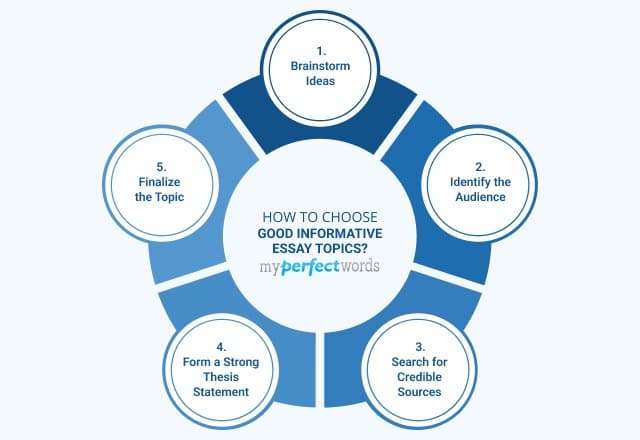
OFFER EXPIRES SOON!
You are using an outdated browser. Please upgrade your browser to improve your experience.

How to Write an Informative Essay: Topics, Structure, and Examples
Yeah, we know. Essays. Again.

We’ve already covered many essay types: persuasive , critical , narrative , you name it! The time has come for informative essays to appear on this blog.
What to do if a teacher assigns this type of academic writing? How to write an informative essay so it would be worth getting A+?
Here you’ll find the ultimate guide on writing informative essays, including the tips on choosing a topic, writing an outline, structuring it step by step, and examples to check for better essay writing .
Table of Contents:
- The structure of an informative essay
- Choose and research your topic
- Write an outline
- Write a rough draft
- Structure your informative essay
- Write a final draft and proofread it
- Topic ideas for informative essays
- Informative essay examples
What is an Informative Essay?
Informative essays aren’t about your subjective opinion or personal viewpoint. Your goal here is not to persuade a reader but tell them about a topic: define a term, analyze data, provide a how-to guide on something, or compare/contrast a subject.
Examples of such writings are textbooks, leaflets, and brochures — texts that inform a reader in a neutral manner. You should write an informative essay in an objective tone and avoid the first person pronouns (I, we).
Sounds too challenging?
You can always ask Bid4Papers professional writers for assistance. Choose a writer with the knowledge and skills that meet your needs best:

The purpose of an informative essay is to educate the reader, providing them with facts and clear explanations on the subject. You don’t argue, and you don’t try to persuade; you share terms and data, compare and contrast facts surrounding the subject, describe, explain how to do something, etc.
Your goal is to leave a reader with in-depth information on a topic. They need to feel educated after they’ve read your essay.
Fun fact: You're reading an informative essay on how to write an informative essay. The purpose is to educate you about the process. We share terms and facts, describe, and explain them step by step, willing to provide in-depth information on the issue.
The problem with informative essays is they look like several other essay types: narrative and expository. Some experts even classify them as the same type of writing, though slight differences between all three have a place to be:
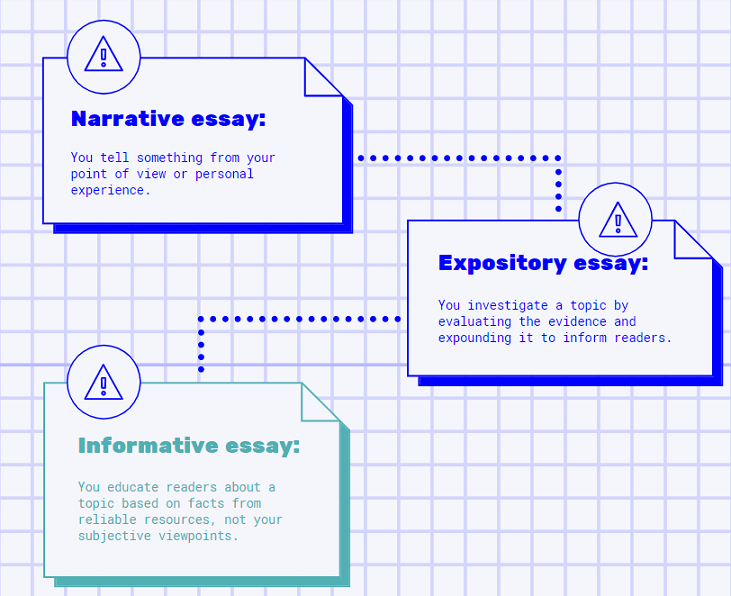
As a rule, students confuse informative essays with expository ones because of the same purpose: to educate readers and explain something to them. But:
- An expository essay defines a single side of an issue , which looks like the first step to writing an argumentative essay .
- In its turn, informative papers are less complicated, requiring less research and focusing on general info about an issue .
Since a purpose of an informative essay is to present the info and educate a reader, many types of academic papers can relate to it. We’ve already mentioned narrative and expository writings, with core differences between them:
Narrative essays are about personal experiences and viewpoints, and expository essays are more about explaining something, not just providing info about it.
Below are five variations that can be informative essays as long as they just provide info rather than try to persuade a reader about something:
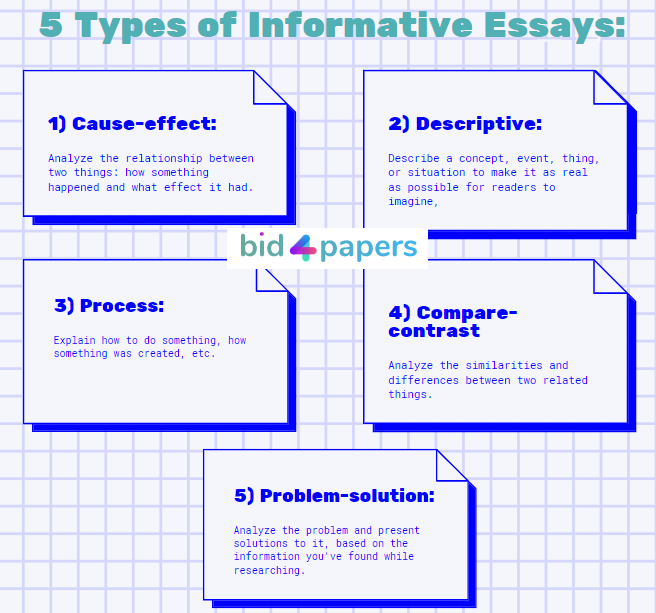
Five common types of informative essays:
- Cause-effect essays: give the connection between two things. These essays can be argumentative if you establish cause and effect, but they are informative if you analyze connections.
- Descriptive essays: tell about a person, event, or situation to make readers imagine it.
- Process essays: explain how something appeared or how to do this or that thing.
- Compare-contrast essays: tell about the similarities and differences between two related things.
- Problem-solution essays: describe a problem and share solutions to it. These essays can be persuasive if you try to represent one solution better than others, but they are informative if you present various possible solutions.
The Structure of an Informative Essay
The structure of your informative essay is not that difficult to remember and follow.
It reminds a standard five-paragraph essay:
You start with an introduction , write a few (usually three) paragraphs to present the main ideas and support them with evidence and facts, and finish with a conclusion summarizing all the claims, restating a thesis, and sharing some final thoughts.
More details: How to Start an Informative Essay
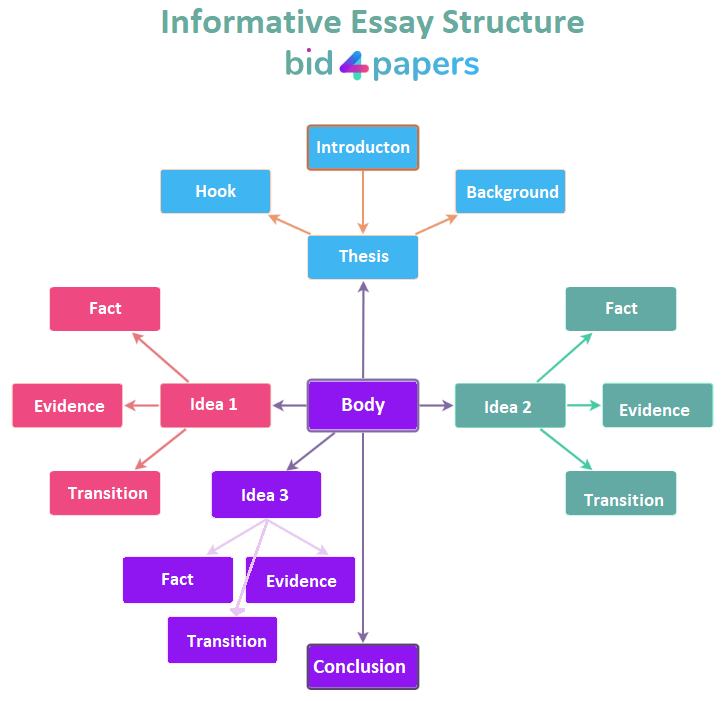
- Introduction: hook, background, thesis statement.
- Body: 3 paragraphs, each representing an idea supported with evidence and facts.
- Conclusion: the summary of all ideas, restated thesis, and final thoughts on the topic.
In the essay introduction , you hook the audience so they would like to continue reading, provide some background information on the topic, and state a thesis explaining the purpose of your paper.
More details:
- How to Write a Thesis Statement for an Informative Essay
- How to Write a Hook for an Informative Essay
In body paragraphs, you tell the audience about some core ideas on the topic. Think about a minimum of three claims to present, and remember to support them with evidence from credible resources for readers to see it’s something they can trust.
Your goal is to provide as in-depth info as possible. After reading your essay, a person should have the impression they’ve learned something new.
In your essay conclusion, wrap up the ideas by restating your thesis and sharing some final thoughts to evoke a sense of closure in readers.
More details: How to Write a Conclusion of an Informative Essay
How to Write an Informative Essay
Below are your five critical steps to take for writing an A-worthy informative essay. Ensure you don’t miss any; otherwise, your complete paper won’t be as brilliant as it could be:
Choose and Research Your Topic
Of course, your teacher can assign a particular topic for writing an informative essay. In this case, do the following:
- Ensure you understand a task inside out: Confirm the required length and other topic parameters; know how you need to cite sources; follow the formatting requirements; ensure you know the due date.
- Conduct research on the assigned topic: Consider reputable sources like academic knowledge bases or publications, university libraries, government agencies, or other .edu resources. Say no to Wikipedia!
However, a common practice today is that a teacher gives students freedom of choice, encouraging them to choose an essay topic themselves. Teachers do that to make your work more enjoyable: After all, it’s easier to write on a topic you love and understand. Plus, it allows a teacher to evaluate a student’s critical thinking, self-reliance, and ability to set priorities.
Choosing an informative essay topic is not as easy as it seems.
The purpose is to provide information about a subject, so you can write about everything that pops into your head. And that’s the problem: How to know your topic is worth considering?
- Don’t take too broad topics: With tons of information available, it will be impossible to cover everything in one essay.
- Avoid too specific topics: You won’t find enough facts and references to cover in your essay.
- Consider topics about some critical issues: social, environmental, technological, etc.
- Find a topic that’s interesting for you so you’d enjoy the process of research and writing.
P.S. Don’t miss the list of informative essay topics we share in the next section of this blog post for your inspiration!
Write an Outline
Once you have a topic and start researching facts, data, and references for it, do your best to take notes and organize everything in an essay outline .
Feel free to use a sheet of paper or type notes on a computer, but try keeping all the information in one place.
Your essay outline will have the following sections: an introduction, three main paragraphs, and a conclusion. Write down the information you’ll need for every paragraph, including ideas and references you expect to use.
It will be a structured plan for your essay. Once you gather and organize the points into paragraphs, it will be easier for you to write a draft.
More details: How to Write an Informative Essay Outline
Write a Rough Draft
Now that you have a detailed outline as a guide, it’s time to write a draft of your informative essay. Everything you need to do is organize your notes into paragraphs.
Remember that it’s a rough draft, so feel free to start with a conclusion paragraph, the second paragraph of your essay body, etc. Just focus on writing and don’t think about spelling or grammar mistakes — you’ll structurize and proofread everything later.
Structure Your Informative Essay
The next step is about structuring your informative essay in parts. That’s a moment when you need to organize each paragraph according to the rules.
- Check if your introductory paragraph has a hook, background information, and a thesis statement.
- Ensure your essay body paragraphs follow the “C-E-E” formula: Each should have a claim (clear idea), evidence, and explanation.
- Check if you use linking words to build transitions between all the paragraphs.
- Ensure you summarize all the ideas in your essay conclusion: restate a thesis (remind about the purpose of your essay) and share some final thoughts.
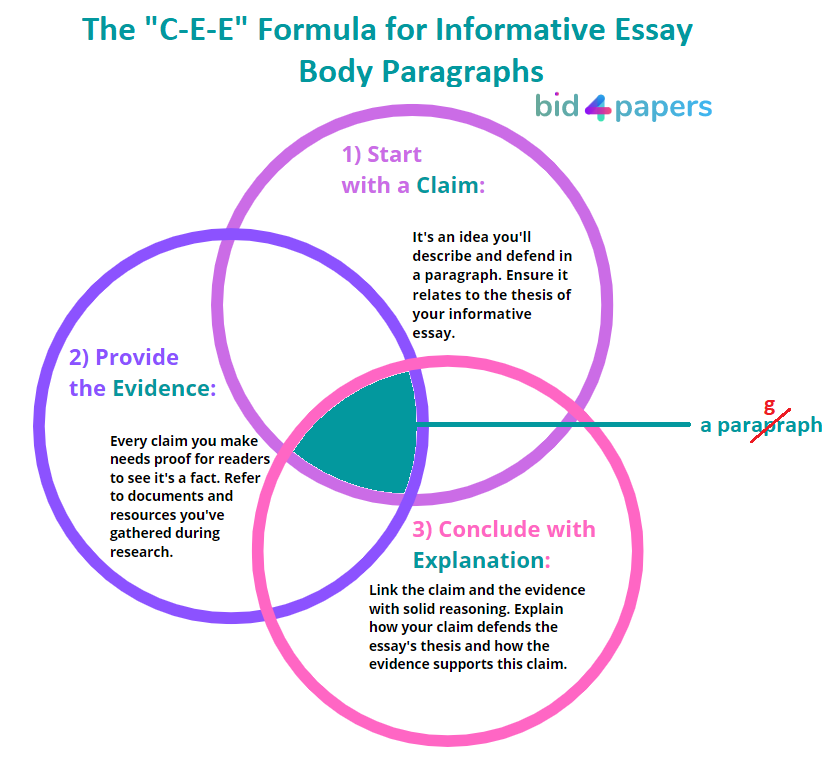
Write a Final Draft and Proofread It
Finally, edit your informative essay before submitting it to a teacher. Read the draft a few times to ensure you’ve told everything about your topic. Answer the following questions:
- Do I have a clear thesis statement?
- Do my essay paragraphs relate to the thesis?
- Have I covered one main idea, supported by evidence and explanation, in every paragraph?
- Are there logical transitions between paragraphs? Have I organized them in logical progression?
- Have I summarized all the thoughts in my essay conclusion?
- Do I use concise and clear language in my essay?
- Have I cited all the resources properly?
And last but not least, proofread your essay . Check it for typos, grammar and punctuation mistakes, redundant adverbs, and other inaccuracies that may influence your final grade for this essay.
Topic Ideas for Informative Essays
Make sure you spend enough time coming up with a good topic. As already mentioned, it’s not as simple as it seems:
It’s critical to find a balance between expository and argumentative topics to ensure yours will be about information, not persuasion or mere description.
For example, a topic like “The best way to deal with unemployment” won’t work for informative essays: It presupposes that you’ll introduce some method being better than others, but it’s about persuasion, not mere information already. At the same time, a topic like “Different methods to deal with unemployment” is okay to use.
Or, let’s take a topic like “Why the government should ban single-use plastic.” It’s more about arguments, not information. However, a topic like “An analysis of the connection between single-use plastic and pollution” may work.
If you find it difficult, go through some informative essay examples to understand what kind of information you will have to find, or go through this list of informative essay topics for inspiration!
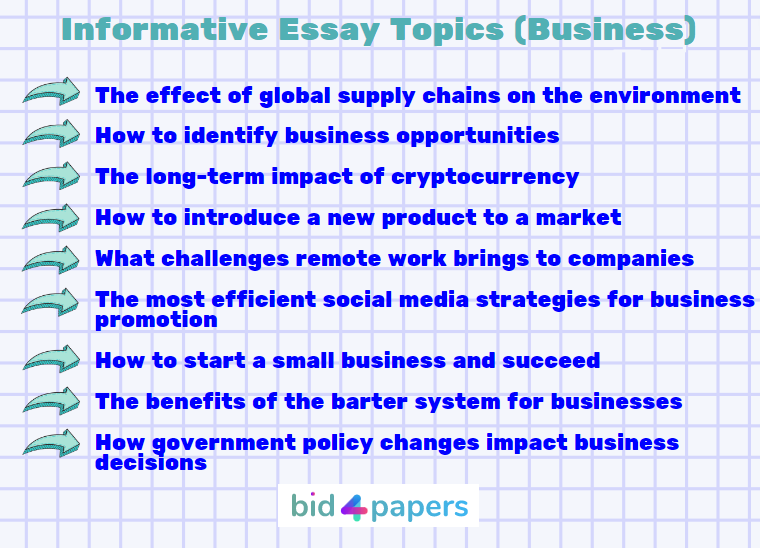
Informative Essay Examples
That’s all well and fine, but are there any examples of informative essays to see what they look like?
Below are three informative essays for your consideration:
- Trends, Troubles, and Tips for the Temple
- Animal Control
- Life Begins At 30
( Note! These samples are for assistance only: Please don’t plagiarize them and don’t copy their parts to use in your own papers. Instead, ask our writers for help – and you’ll get an A-worthy informative essay right away.)
Any questions left? We are waiting for you in the comments section!
Related posts
- Harvard Referencing Style: A Comprehensive Guide
- What Is the Difference between Primary and Secondary Sources
- Common Types of Plagiarism with Examples
Our Writing Guides

Improve your Grades
How To Write An Informative Essay | Steps and Format of an Informative Essay
September 28, 2020 by Prasanna
How To Write An Informative Essay: What Is an Informative Essay? As the name suggests, an informative essay is a type of essay where the author enlightens its readers about a person, object, phenomenon or events related to the topic of the essay. The main goal of an informative essay is not to give the writers opinion on their topic of writing, but to make their writing informative and educating for the audience.
The write up should be not only informative but also enjoyable. Writers often have a point of you about the topic they are writing. Still, as the sole purpose of writing an informative essay is to educate the audience on the topic, authors should refrain from giving their opinion on the subject.
You can read more Essay Writing about articles, events, people, sports, technology many more.
When writing an informative essay, you should keep in mind to showcase every angle of the subject without being opinionated.
Usually, an informative essay might be informing its readers about some problem which is not known to them, explain the importance of the topic and provide the readers latest researched information about the topic. When writing on a controversial topic, compare the viewpoints without being opinionated and establish a cause and effect relationship.
Types Of Informative Essay
There are five main types of informative essays.
- Process Essay: In this type of writing, you need to describe the process of a phenomenon. Also known as ‘How-To’ essay, a process essay is the type of essay where the writer needs to provide detailed information on the chronological order of performing a process.
- Analysis Essay: In this type of essay, you look into a set of data or an image or at a text and analyze the information. You conclude and make interpretations on the information.
- Classification Essay: In a classification essay, things are categorized into different categories, and the things are described accordingly.
- Definition Essay: This is the type of essay where the writer describes something. This essay is not necessarily a dictionary definition but a new and creative way to think about the subject.
- Cause/Effect Essay: This is the type of essay where the author talks about the cause of a phenomenon, event or idea and then describes the effect that has in today’s world, on the environment and the people.
Possible Informative Essays Topics
- World Poverty
- Air pollution
- Procrastination and its effects
- History of women’s rights in history
Steps for Writing An Informative Essay
The sole purpose of an informative essay is to educate its readers about the topic in-depth and also giving a clear explanation of a subject. The writer should bombard the targeted audience with information and facts that surround the issue, so the readers after reading are full of facts and educated about the subject.
When writing an informative essay, follow the following steps to have a well-crafted essay.
- When writing an informative essay, choose a topic that interests you. This will make not only the writing process but also the research interesting for you.
- Choose a theme that you have an idea about, which will make the process of finding information more accessible.
- Choose a topic that you can support with evidence, facts and statistics.
- Decide Your Targeted Audience: Keeping in mind who your targeted audience is and what kind of essay they are expecting is essential when writing an informative essay. This will help you keep in mind how much information needs to provide in your write-up to keep your readers hooked.
- Research Extensively On The Subject: Informative essay is the type of essay which requires a lot of evidence that is reliable to fulfil the primary purpose of the essay, to educate the audience. You can only build a well-crafted informative essay if you have a lot of information answering the question of the write-up.
Refer to articles written from reliable sources, interviews and experiments; this will make your writing enjoyable for the reader to go through. Brainstorm ideas, make notes, not challenges and state objectives.
Some excellent sources for researching for an informative essay:
- Encyclopedias
- Government websites
- Peer-reviewed journals
- Websites of reputable organizations.
Outline: Outlining helps the writer helps the reader where to go with the essay. Outlining helps the reader in getting a better view of all the collected data and gives them the chance to decide how they want to plan out the essay. Organizing and collating this collected information will form both your passage layout and your thesis statement.
Passages of An Informative Essay
Like every other essay, an informative essay has three passages, introduction, body and conclusion.
- Introduction: since the purpose is to educate the audience regarding the topic, many start the essay with the dictionary definition of the topic. While you can always do that, but it is suggested to not, as it becomes very cliché. The goal of the introduction is to draw the attention of the readers within those few sentences. Provide an overview of the ideas included in the main paragraph of the writing. If the topic is a controversial one, mention the controversies showing that you are not shying away from addressing them. There should be a well-developed thesis statement at the end of the introductory paragraph.
- Body: Divide the body into several paragraphs. Mention each fact in a separate paragraph. The middle part of the essay should have arguments supporting the thesis statement stated in the introduction. All the information that you have collected on the topic should be mentioned in the body section. Create a smooth transition not only when moving from the introduction to the body, but also in between the body paragraphs. There should be a target point and supporting details in every paragraph.
- Conclusion: After you have laid out your researched points in the middle section, it is now time to wrap up the writing. Try and make the ending catchy so that it leaves an impression on the readers and make them think about it. Restate the thesis statement and summarize all the important points stated in the paper, but remember not to repeat the already stated points.
- Revise, Recheck And Edit: Once done with the essay, revert to the outline that you created and see that you have not missed out any points. Take the responsibility of checking that you have described everything in the correct chronological order. If needed, make the edits, to craft a well-developed essay.
Format Of An Informative Essay
- An Introductory Paragraph To Hook The Readers: Start the introductory paragraph with a hooking point to ensnare the readers. Stating the hook in the first, it will interest the readers and give them a reason to read on.
- Well-crafted Thesis Statement For Direction: Every paragraph has a thesis statement usually included in the last of the introductory paragraph. It is the most critical line of the paper, stating the main argument of the essay. A thesis statement is used by writers to clarify the subject you are discussing.
How to Write The Body Of An Informative Essay
When writing the body, divide the paragraph into four distinct steps so that you can well-develop the body paragraphs.
- The claim of the paragraph is simple and usually the first sentence of the paragraph, stating the main point of the paragraph. It is an easy and logical way to follow a discussion.
- Back up our claim with supporting evidence. Supporting evidence could be experiments, articles, documentation or interviews.
- Once done stating the supporting evidence, you will want to explain how the finding is necessary or relevant to the topic.
- Always end all the body paragraphs with a concluding statement that ties up the paragraph nicely and provides a clear and crisp transition from one paragraph to another.
How To Write The Conclusion Of An Informative Essay
When writing the conclusion, restate the thesis statement by not the word to word as you have done in the introduction. Provide the readers with a brief overview of the main points stated in the body.
Finally, finish the conclusion with a clincher which will give your writing a powerful ending. The clincher can be a statement of truth, a thought-provoking quote, whether it answers a common question or a lingering question that has not yet been answered by any researches.
FAQ’s On How To Write An Informative Essay
Question 1. What are the few things one should avoid when writing an informative essay?
Answer: Keep the following things in mind to craft a successful, informative essay.
- Do Not Give A Personal Opinion: The purpose of the essay is to inform and educate the readers about the topic. You should not express your attitude and point of view regarding the topic, don’t make the essay a persuasive one nor try to analyze the topic.
- Don’t Bluff, Be Honest: Provide all the data and information that you have found. Don’t try and avoid the opposing sides of the subject. You must provide all the details of the topic and give your readers the freedom to develop based on the information that you serve.
- Make Sure That Your Write-Up Is Logical: Informative essay should be logical. Follow the outline that you have created and place the information accordingly. Make sure the essay is consistent by using transition words, making the change from one fact to another smooth and exact.
Question 2. What should one remember when choosing a topic for an informative essay?
Answer: Use the following tips to choose the best informative essay topic.
- Avoid selecting a broad topic as well as a narrow topic. Try and find a balance and choose a topic where you need not provide way too much or way too less information.
- Avoid choosing a topic that you have no interest in. If you have competence for the topic, it makes writing on the topic more accessible.
- Engage the audience by providing valid and exciting information and telling them why the topic is relevant in today’s society.
- Picture Dictionary
- English Speech
- English Slogans
- English Letter Writing
- English Essay Writing
- English Textbook Answers
- Types of Certificates
- ICSE Solutions
- Selina ICSE Solutions
- ML Aggarwal Solutions
- HSSLive Plus One
- HSSLive Plus Two
- Kerala SSLC
- Distance Education

IMAGES
VIDEO
COMMENTS
The main goal of writing an informative essay is to; Inform the reader about something. Explain a particular subject. Transmit verified knowledge clearly and concisely. Types of Informative Essay. There are several types of informative essays, and each type has its own purpose and style. Here are some of the informative essay types that you ...
The purpose of an informative essay is to educate others on a certain topic. Typically, these essays will answer one of the five Ws: who, what, where, when, and why. Of course, they can also answer "how," indicating how to do something.
Breaking Down Five Informative Essay Examples. Here, we will review several informative essay examples, analyzing if they have a good opening, clear and precise body paragraphs, and appropriate ending. We will also check the essays’ type and explain whether or not they look like informative papers.
Crafting an informative essay requires a structured approach to organize the wealth of information in a way that’s easily understandable to the reader. The format of an informative essay typically consists of three main parts: the introduction, the body, and the conclusion.
An informative essay may explain new information, describe a process, or clarify a concept. The provided information is objective, meaning the writing focuses on presentation of fact and should not contain personal opinion or bias.
An informative essay introduction includes the following information: A hook statement to excite the audience; The background context of the chosen topic; The main thesis statement; Writing an introduction that tells your reader what to expect is essential for your informative essay’s effectiveness. Detailed Body Paragraphs
Below are five variations that can be informative essays as long as they just provide info rather than try to persuade a reader about something: Five common types of informative essays: Cause-effect essays: give the connection between two things.
When writing on a controversial topic, compare the viewpoints without being opinionated and establish a cause and effect relationship. There are five main types of informative essays. Process Essay: In this type of writing, you need to describe the process of a phenomenon.
Let’s explore the three main components of an informative essay: the introduction, body paragraphs, and conclusion. The introduction serves as the starting point of your essay, where you grab the reader’s attention and provide an overview of the topic.
There are five main types of informative writing: Pay attention to the fact that while these methods of informative writing differ in certain characteristics, the characteristic they all share is objectivity. 2a. Process Writing. Process writing describes the steps of a process in detail.